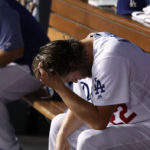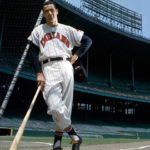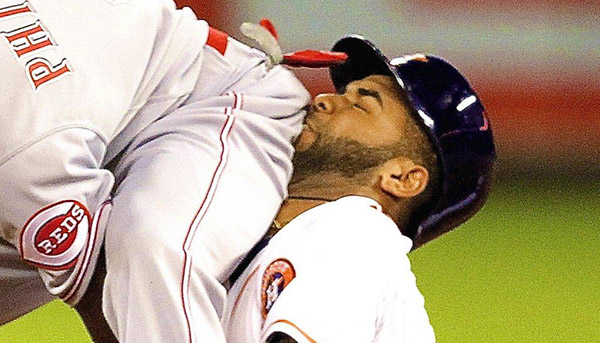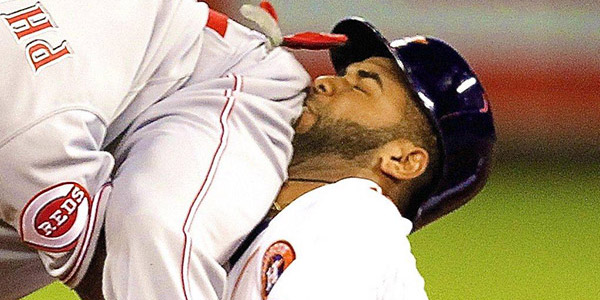Bryce Harper: Hero to Antihero?
 Usually a player who has put up great (and that could be Hall of Fame-like) numbers is recognized as his team’s most dangerous offensive weapon. A star. Players like Bryce Harper, Manny Machado and Giancarlo Stanton.
Usually a player who has put up great (and that could be Hall of Fame-like) numbers is recognized as his team’s most dangerous offensive weapon. A star. Players like Bryce Harper, Manny Machado and Giancarlo Stanton.
Yet the fans’ adulation is not baked on – players must earn it. Try striking out with the bases loaded in a one-run game, two men out, in the ninth inning – and do it several times in a row. Or forget how to deliver in the clutch. Or fail to come up big when the team needs the player most. Fans can fall out of love with a player just as easily as they fell in love – if he disappoints them enough.
Hero to antihero.
Then newspaper stories start to circulate about the star player. Writers “explain” what has happened. The fans notice these failures in the paper or hear them bantered about on talk radio and the discussion begins to change public opinion about a player.
Hero to antihero.
About a month ago an article called The Fall Guy appeared in The New York Times Magazine Section. Author Sam Dolnick argued that fans have begun to mock players who were once heroes before they failed to deliver in the clutch.
Dolnick’s focus was the NBA. In particular, LeBron James’ fall from grace during the difficult 2018-2019 season in Los Angeles. Imagine the willful inadequacy of LeBron to not only not win another championship, but to fail to even make the playoffs. Isn’t that why he came to LA in the first place? For a boatload of dollars, another NBA championship and some Hollywood mustard?
Didn’t LeBron understand that anything less than a championship would not suffice? All the mustard in the world notwithstanding. Failure to deliver was not an option. So the fans began to turn on him.
This doesn’t mean LeBron can’t win the fans back if he leads next years’ Lakers to the promised land. Fans have short memories. And in a “what have you done for me lately” business, the early bird gets the worm.
That’s why Dolnick wrote, When a hero’s weaknesses begins to show, . . . [the fans] circle like hyenas. Hero to antihero.
Dolnick’s message applies to baseball players as well. Witness the brouhaha unfolding around Bryce Harper in Philadelphia as spring blossoms into summer.
Bryce Harper in Philadelphia, A Tragic Choice?
In baseball, perhaps the toughest sport to excel in – given the diabolical assortment of change-ups, sliders, sinkers, cutters, curveballs, and of course 100-mile-an-hour fastballs aimed at the corners of the strike zone – hitters (or pitchers) who hold out for big dollars are asking for trouble from fans – especially if they fail to live up to expectations.
Unfortunately, the top echelon of baseball players – the ones on expensive multiyear contracts – are the players who stand out. Players often referred to by their contracts. Such as, “and now the $300 million man steps to the plate.” Or a description that weaves a player’s compensation into his bio. Big money is who the player becomes.
Hero to antihero.
Bryce Harper, of the 13-year $330 million contract, has proven quite fallible in Philadelphia so far his first spring. The astronomical salary he is being paid is very public knowledge. Imagine the locals’ belief that Harper came from heaven to make Philadelphia special again. And so far that’s been tough to believe, despite all the hype to the contrary when Harper signed his contract.
The team is in first place, but not because of Harper. He has put up mediocre numbers (in 56 games and 206 at-bats (as of Thursday, 30 May) he has 10 homers, 41 RBIs, a dismal .252 batting average – though a respectable .370 OBP and .860 OPS). His combination of average production and bloated compensation has provided the fans of Philadelphia meaty fodder to boo him with every time he steps to the plate.
And while some may have hoped Harper might lead Philadelphia into the promised land, the numbers he has put up to this point scream mediocrity, not excellence. Not fantabulous, which is what was expected of him when he signed his contract.
Of course, there are 106 games remaining for Harper to flaunt his $330 million feathers. Unless he does spread his wings, the fans in Philadelphia have him lined up in their sights. Hero to antihero.
Why Do They Ask For So Much?
Asking for the world is the foundation of capitalism. More is always better. And many players hire agents (lawyers and accountants) like Scott Boras and his competitors who invariably advise them to break the bank. Agents who tell them that ownership can afford $30 or $40 million a year (which is true) and then advise them not to leave any crumbs on the table.
The problem is that Bryce Harper and Manny Machado are now earning 600 times as much as ordinary workers who make $50,000 a year. They stick out like a sore thumb in a money-obsessed culture. They have what most Americans want. About 600 times as much.
That same ordinary American walks up to a ticket window at a major league ballpark and purchases two tickets. Does the math. Realizes he’ll have to work six or seven hours the next week to see this game. Yet he still wants to see the game even though it might be the only game he sees all season.
There are now reports by the Associated Press that MLB attendance problem is getting worse. More fans could be choosing not to see games in person because of the increasingly high cost of seeing bad teams play meaningless games. The unspoken elephant in the room is that increasing player salaries are constantly driving up ticket prices.
Fans are human and lose interest if their favorite team is continually losing or playing sloppy baseball. Sixteen of the 30 baseball teams are currently at or below .500. Watching the San Francisco Giants play the Miami Marlins – ouch. Spending three hours watching a boring New York Mets game is a masochistic exercise. At times, dreadful.
While a team with a great player on its roster like Mookie Betts, Xander Bogaerts, and Rafael Devers in Boston, Francisco Lindor in Cleveland, Nolan Arenado in Colorado, Cody Bellinger in Los Angeles, George Springer and Alex Bregman in Houston, and Austin Meadows and Tommy Pham in Tampa Bay, make it a treat to go to the ballpark. Or tune the game in on television.
Especially when the players are innocent in baseballese. Meaning the player is still in the first six year window prior to the corruption of free agency, before money begins to taint their souls.
Mookie Betts has already turned this corner (rejecting $200 million from the Red Sox last winter), as has Nolan Arenado, who signed a lucrative contract extension to stay with Colorado. Hero to antihero, soon?
Perhaps the real question about Bryce Harper, who had been THE key player on the Washington Nationals, is why he never led them into the World Series? Or won a World Series with all the talented pieces around him? Aren’t championships the ultimate goal?
Can any player in any sport who is not an instrumental factor in several championships prove he deserves $20 million or $30 million per season without that championship? Shouldn’t that be the metric?
The Reggie Jackson Factor
Shouldn’t a player have to perform like Reggie Jackson – “Mr. October” – to be worth tens of millions of dollars when free agency hits
Those who remember Jackson’s tenure with the Yankees (five years at $2.7 million) may also remember his contentious relationship with Yankee owner George Steinbrenner who repeatedly embarrassed and insulted Jackson, especially when Jackson had a bad game or series. (Dave Winfield (10 years at $23 million) was treated much the same way by Steinbrenner when he replaced Jackson for the 1981 season and beyond.)
Despite Steinbrenner’s rash judgments, Jackson was one of the few players in World Series history who won five World Series rings.
So, was Jackson’s five-year contract a bargain? Should he have been the first million dollars a year player when he signed in 1976 after three World Series championships with Oakland? (Nolan Ryan became baseball’s first million dollar a year player in 1980.) Many think Jackson was not only a bargain but perhaps the best player to hit free agency. Ever.
The other side of this argument is Mike Trout who plays for a team that has been unable to build a championship group around him. He’s still a great player and has been paid like it.
The question is why the Angels have not cashed in on Trout’s greatness for a bushel of prospects to remake their team in a different mold? They don’t seem to be going anywhere again this season with Trout, despite his superior numbers.
Yes, Trout is still a hero. Even though he’s only played in one postseason series in his career. That was in 2014 when he went one for 12 with a home run as the Angels were swept by Kansas City three games to none. Trout is a great player, not a General Manager.
But, Bryce Harper played on several great Washington Nationals teams that won more than 90 games four times between 2012 and 2018. Each of those 90 win teams lost the Division Championship.
As good as Harper was, he never made the difference. In 19 postseason games, Harper had an .801 OPS, a .315 OBP, and hit 5 home runs. Yes he looked like a great player, but never produced like one.
Yet when he hit free agency he demanded to be paid like a great player. Sadly, he is not a great player. Harper is not Reggie Jackson or Paul O’Neill, both of whom won five World Series.
So far Harper has not shown himself to be a winning player, despite the numbers. He did not merit the contract he received. Hero to antihero? Maybe.
Only time will tell if his contract will become an albatross around Philadelphia’s head.

























